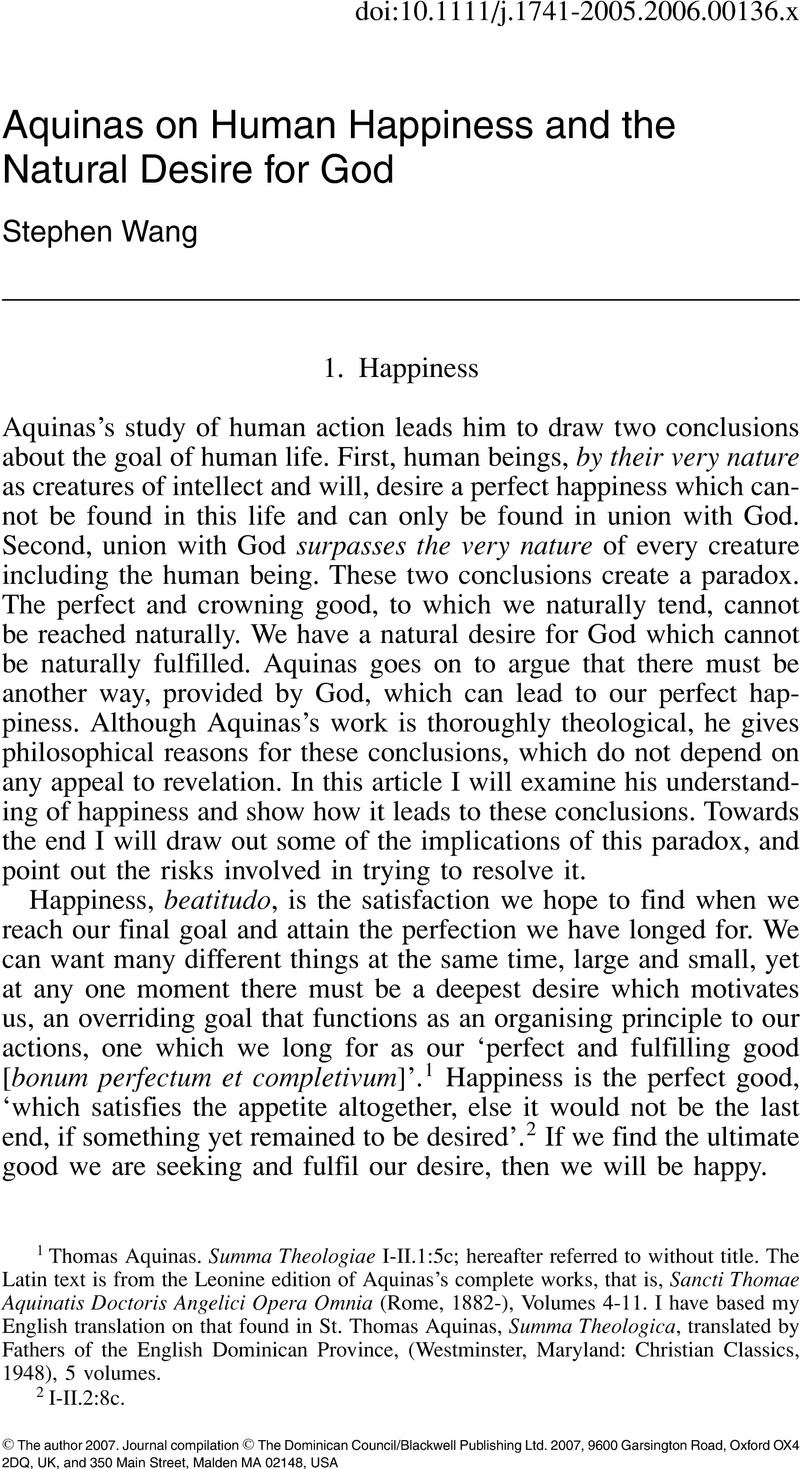Article contents
Aquinas on Human Happiness and the Natural Desire for God
Published online by Cambridge University Press: 01 January 2024
Abstract

- Type
- Original Articles
- Information
- Copyright
- Copyright © The Author 2007. Journal compilation © The Dominican Council/Blackwell Publishing Ltd 2007, 9600 Garsington Road, Oxford OX4 2DQ, UK and 350 Main Street, Malden, MA 02148, USA
References
1 Thomas Aquinas. Summa Theologiae I-II.1:5c; hereafter referred to without title. The Latin text is from the Leonine edition of Aquinas's complete works, that is, Sancti Thomae Aquinatis Doctoris Angelici Opera Omnia (Rome, 1882-), Volumes 4-11. I have based my English translation on that found in Aquinas, Thomas St., Summa Theologica, translated by Fathers of the English Dominican Province, (Westminster, Maryland: Christian Classics, 1948), 5 volumesGoogle Scholar.
2 I-II.2:8c.
3 For the historical background to Aquinas's discussion of happiness and for an account of some of the influences on him, see Wieland, Georg, “Happiness: The Perfection of Man,” in The Cambridge History of Later Medieval Philosophy, ed. Kretzmann, Norman, Kenny, Anthony, and Pinborg, Jan (Cambridge: Cambridge University Press, 1982)Google Scholar.
4 See the discussion of the indetermination of ends in Article 6 above. I-II.1:7c.
5 The theological distinction goes back to William of Auxerre, died 1231. See Wieland, “Happiness: The Perfection of Man,” 679. Aquinas uses it to develop some unresolved themes in Aristotle's Nicomachean Ethics, where, for example, worldly happiness is subject to fortune, and contemplation, although the best activity of the human being, is also something beyond human attainment. See Aristotle, Nicomachean Ethics, trans. Terence Irwin (Indianapolis, Indiana: Hackett Publishing Company, 1985), 10:7, 1177b26 to 1178a6 and Anthony Kenny, “Aquinas on Aristotelian Happiness,” in Aquinas's Moral Theory: Essays in Honour of Norman Kretzmann, ed. Scott MacDonald and Eleonore Stump (Ithaca and London: Cornell University Press, 1998), 24. Anthony Celano argues convincingly that in formalizing these distinctions Aquinas draws out the implications of Aristotle's ethics without betraying his thought. See Celano, Anthony J., “The Concept of Worldly Beatitude in the Writings of Thomas Aquinas,”Journal of the History of Philosophy 25 (1987)CrossRefGoogle Scholar.
6 I-II.4:5c.
7 I-II.3:6c.
8 I-II.11:4c.
9 I-II.5:3c.
10 The Prologue to Part II, for example, sets the whole question of the nature of the human being in a theological context: The human being ‘is made in God's image’, and Aquinas only treats of God's image here because he has already spent the 119 questions of Part I treating, broadly speaking, of God himself. I-II Prol, ‘factus ad imaginem Dei’.
11 I-II.5:3c.
12 I-II.5:3c.
13 See I-II.18:1. Cf. I.5:1.
14 I-II.5:3c, referring to Augustine's De civitate dei, 19:4.
15 I-II.2:1ad3.
16 I-II.2:8ad3.
17 I-II.11:3c, referring to De Trinitate, 10:10.
18 I-II.11:3c.
19 I-II.11:3c.
20 I-II.5:3c.
21 I-II.5:4c.
22 I-II.5:4c.
23 I-II.3:2c.
24 Life involves the being of the living thing (esse viventis) and also the activity of the living thing (operatio viventis). I-II.3:2ad1.
25 I-II.3:2ad4.
26 I-II.2:8c.
27 I-II.2:8ad3.
28 Cf. I-II.18:1c, where some things are said to lack the fullness of being ‘due to them’ (eis debitam).
29 I-II.5:1c.
30 I.12:1c.
31 I.12:1c.
32 To argue otherwise ‘is also against reason’. I.12:1c.
33 I-II.3:8c.
34 I.2:1ad1.
35 I-II.5:5c, referring to I.12:4.
36 I-II.5:6c.
37 Cf. I-II.2:8 and I-II.3:8.
38 I-II.5:5c. Cf. I.12:4.
39 Bradley, Denis J.M., Aquinas on the Twofold Human Good: Reason and Human Happiness in Aquinas's Moral Science (Washington, DC: The Catholic University of America Press, 1997), xiiiGoogle Scholar.
40 Ibid., 514.
41 Recent debate was provoked by the publication of Lubac, Henri De, Surnaturel: Études Historiques (Paris: Aubier, 1946)Google Scholar. For an excellent discussion of some contemporary views, see Benedict M. Ashley, “What Is the End of the Human Person? The Vision of God and Integral Human Fulfillment,” in Moral Truth and Moral Tradition: Essays in Honour of Peter Geach and Elizabeth Anscombe, ed. Gormally, Luke (Blackrock, Co. Dublin: Four Courts Press, 1994)Google Scholar.
42 In scholastic philosophy and theology ‘supernatural’ simply means what is above or beyond nature, what is beyond the unaided powers of any creature – it has nothing to do with spooks or spells (which, as created things, might be quite ‘natural’).
43 I-II.5:5ad1, citing Aristotle's Nicomachean Ethics 3:3, 1112b27.
- 5
- Cited by




